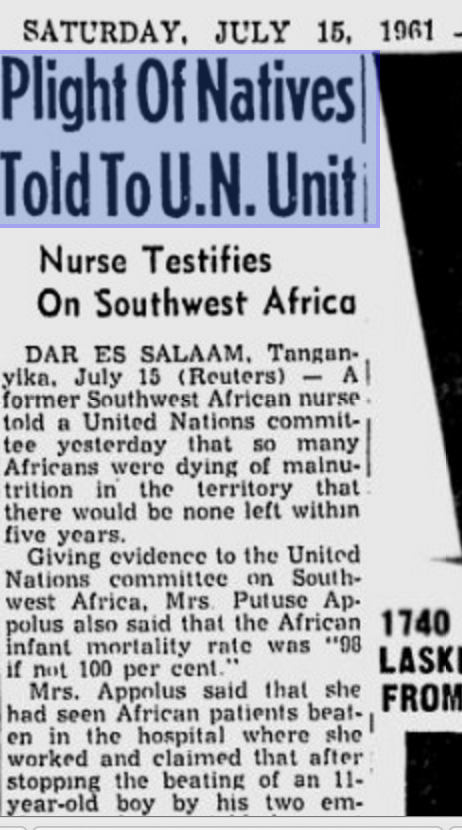By: Lydia Walker (Institute of Historical Research/Leiden University)
Originally Published 15 January 2016 [LINK TO ORIGINAL]
After the First World War, what was then German South West Africa became a League of Nations mandate ruled by South Africa. In practice, being a mandate meant little – South Africa ruled Namibia like a fifth province. But in theory, mandate status meant supposed international oversight. When the United Nations Organization came into existence in 1945, Namibia got its own UN committee, the Committee on South West Africa.
The world after 1945 was a world of colonies struggling to be independent nations, of empires holding on, letting go, and at times remaining behind the scenes. From 1945 to 1965, the UN swelled with new states. In 1960 alone, seventeen former colonies in Africa became independent. The UN was the chosen vehicle for handling the emergence of these states within international relations and reaching the UN was important legitimization for anti-colonial nationalists. Unlike other movements, Namibians had their own UN committee. Speaking to and with that committee shaped Namibian national independence strategies.
Many participants in and scholars of national liberation have written about Namibian petitioning to the UN: Much ingenuity was required to get a person or tape from Windhoek or Cape Town to New York. At this time, South Africa controlled all movement. Traveling to New York without a permit or passport required money, sacrifice, and connections. Petitioning was not cheap, but it made Namibian nationalists a state-in-waiting, with their own informal delegation at the UN.
Petitioning put the inequities of South African rule on trial before an international audience. It also personalized politics. Petitioners used their personal stories of oppression, resistance, and ingenuity to make political claims. In response, the South Africa delegation to the UN carried out their own counter-research on Namibian petitioners.
The National Archives of Namibia hold a dossier of this counter-research collected by the South West African Authority for the UN. The SWA Authority spent most of its time trying to undermine the Namibian petitioners’ reputation as moral representatives of their people.

The SWA Authority’s account of why the UN should not listen to the petition of Putuse Appolus (1930-1986) was almost comical. They lumped together a variety of allegations that had nothing to do with Mrs. Appolus’ testimony to the UN, which had focused on the infant mortality rate in Namibia [see press clipping]. Instead, they attacked her personal character and professional skill:
“Before dealing in detail with the long statement of Sister Putuse Ntshona (now Appolus), it is necessary to point out that she is a most unreliable person. As a married woman she came to work at Keetmanshoop State Hospital. On 1/8/1957 she had an affair with Mr. Appolus. Their behavior in the nurses’ home (where no male visitors are allowed) was so bad that other nurses asked the superintendent on several occasions to tell Mr. Appolus to leave the premises. Eventually they drew up a petition asking that Sister Putuse Ntshona herself be removed from the nurses home … After she left the monthly average of deliveries at the [Keetmanshoop] State Hospital jumped from 3.5 to 13 … After leaving South-West Africa illegally, she went to Congo via Bechuanaland. In Congo she worked as a nurse and when Mr. Appolus joined her she stole R80 from her employers and they fled to Dar es Salaam together.”
The stories told by the SWA Authority show how personal the politics of UN petitioning was. Instead of seeking to undermine the testimony of Namibian nationalists, South Africa sought to discredit the character of the nationalists themselves.
The UN petitioning process made national claims-making personal. Namibians used their experiences as evidence for the injustice of South African rule, speaking both as individuals and as representatives of their people. In turn, the SWA Authority sought to demolish their credibility as individuals who had the standing to represent others. Petitioning and counter-petitioning relied on the person – the petitioner – as the voice of the prospective nation. The words and character of the individual became a battleground in the struggle for and against national independence for Namibia.
